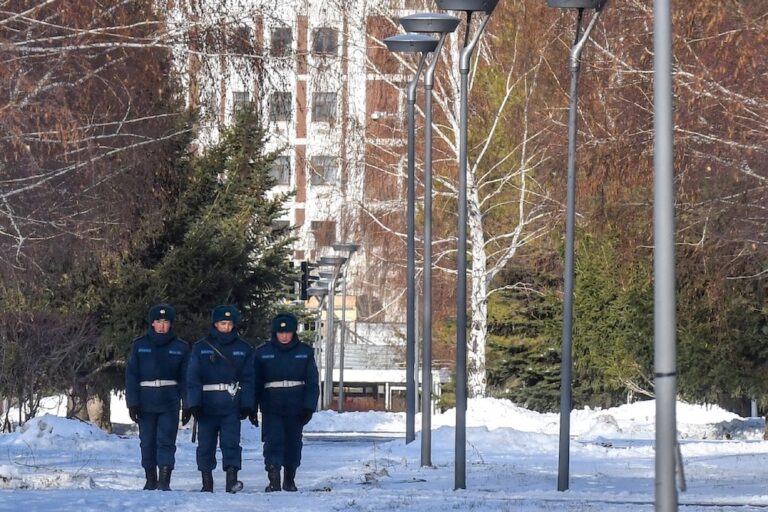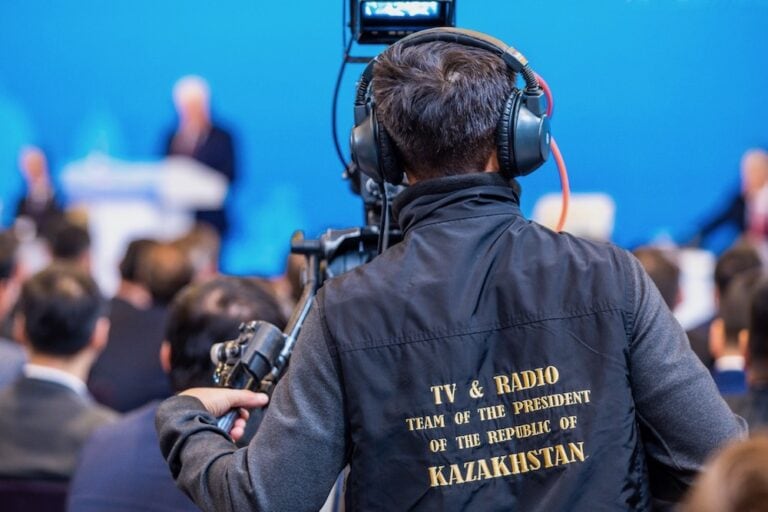(CPJ/IFEX) – In a 7 June 2000 letter to President Nursultan Nazarbayev, CPJ stated that it was disturbed by his government’s apparent efforts to intimidate, bankrupt, and ultimately silence the Almaty independent weekly “Nachnem s Ponedelnika” in response to its revelations of alleged official corruption. Staff at the newspaper claim they are under pressure from […]
(CPJ/IFEX) – In a 7 June 2000 letter to President Nursultan Nazarbayev, CPJ stated that it was disturbed by his government’s apparent efforts to intimidate, bankrupt, and ultimately silence the Almaty independent weekly “Nachnem s Ponedelnika” in response to its revelations of alleged official corruption.
Staff at the newspaper claim they are under pressure from the general prosecutor’s office, from tax inspection officials, and from the mayor of Almaty, Viktor Khrapunov, because of articles that implicate these officials in cases of alleged corruption.
Since 11 October 1998, “Nachnem s Ponedelnika” has been sued seventeen times for defamation, according to CPJ’s research. The majority of these cases were filed by government officials or executives of companies with close links to the government. In three cases, the paper was found guilty of slander and fined a total of 25,935,000 tenge (about US$180,000). Two of the suits were
later dropped by plaintiffs, and twelve cases are still being investigated or are pending in the courts. CPJ believes the volume of cases filed against the newspaper suggests systematic harassment and the abuse of privacy laws by public officials.
At a hearing held on 24 May, an Almaty court ordered the seizure of “Nachnem s Ponedelnika”‘s corporate assets, along with the personal assets of its founder and executive director, Ramazan Yesergepov, as compensation for unpaid fines. Yesergepov objects to the ruling, and claims the newspaper was unable to plead its cause because it was not invited to the hearing, at which the judge also ruled that a criminal case should be opened against Yesergepov himself.
On 25 May, over thirty policemen, including representatives of the Special Forces (OMON) and security services, stormed “Nachnem s Ponedelnika”‘s editorial office and confiscated the entire 26 May print run (53,000 copies), according to newspaper staff and local sources. The newspaper’s editor-in-chief, Valeriya Marchenko, told CPJ that the police had no warrant for the raid. They removed research materials, financial records, office equipment, and furniture from the offices, effectively closing the paper.
Yesergepov argues the raid was illegal, since Kazakhstan law stipulates that a media outlet has ten days to file an appeal after a court ruling that its assets be seized to cover unpaid fines. The law also states that all confiscated property must be catalogued and valued rather than summarily removed. Yesergepov also told CPJ that the police deliberately damaged the newspaper’s equipment, although the law states that seized assets should be handled carefully.
CPJ is also concerned about reports that printers all over the country have been ordered not to publish “Nachnem s Ponedelnika”, along with the newspapers “Do i Posle Ponedelnika” and
“Ponedelnik”, which Yesergepov launched following the 25 May raid. Officials allegedly warned printing houses against handling these or any other publications critical of President Nazarbayev’s regime, according to Almaty-based press freedom advocates.
Recommended Action
Send appeals to the president:
– protesting the judicial intimidation of “Nachnem s Ponedelnika”
– urging His Excellency to ensure that all legal proceedings conducted against newspapers in Kazakhstan are handled in accordance with international due-process standards
– further asking that officials cease attempting to block the publication of material that may be critical of government authorities, and that all journalists in Kazakhstan be allowed to work without fear of reprisal
Appeals To
APPEALS TO:
His Excellency Nursultan Nazarbayev
President of Kazakhstan
Republic Square
Almaty, Kazakhstan 480091
Fax: +7 3272 637 633
Please copy appeals to the source if possible.


